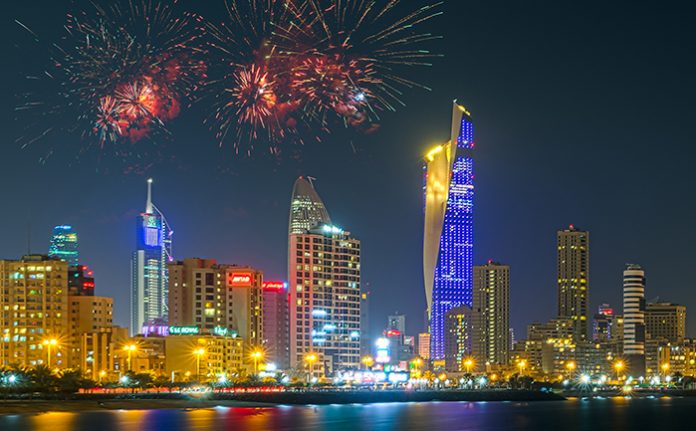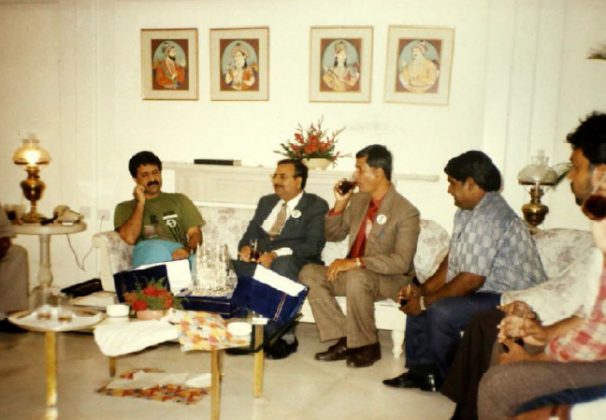Mohammed Aslam Imadi
Salam Kuwait. Kuwait is a great place and I thank Allah for blessing me to be in this great land for around 30 years.
 In 1988, while working for a leading engineering company in Hyderabad, India, I came across an advertisement in the Times of India newspaper from Kuwait Oil Company (KOC) for a Senior Engineer to work in the company’s Maintenance Service Department. I applied for the post based on my experience, but soon forgot about it as there was no response from the company.
In 1988, while working for a leading engineering company in Hyderabad, India, I came across an advertisement in the Times of India newspaper from Kuwait Oil Company (KOC) for a Senior Engineer to work in the company’s Maintenance Service Department. I applied for the post based on my experience, but soon forgot about it as there was no response from the company.
However, in April 1989, I was surprised to receive a favorable reply from KOC, along with a prepaid airline ticket and an invitation to attend an interview in Kuwait. Though I knew very little about the country or company, I decided to take a chance and proceeded to Kuwait for the interview. I was impressed by the country and more so by the company and following a successful interview decided to join KOC.
I joined KOC on 9 July 1989 and retired on 1 November 2013. However, the Technical Expertise Team hired me through a Secondment Contract as Projects Engineer from 2013 until June 2015. After which I worked as Lead Design Engineer until 24 June 2019 at Gas Projects Management Team.
Kuwait Oil Company is an oil company headquartered in Ahmadi, Kuwait. It is a subsidiary of the Kuwait Petroleum Corporation, a Government-owned holding company. Kuwait is the world’s 10th largest petroleum and other liquids producer and fifth-largest exporter in terms of volume of crude oil, gas and condensates.
My 30 years in Kuwait with KOC has been a long and satisfying journey and forms a big part of my life. During this period the greatest shock and suffering I experienced was the evil invasion of Kuwait by Iraq under Saddam Hussein on 2 August, 1990.
It was a Thursday and a KOC holiday. Most of us did not know of the invasion until late in the afternoon. I was then living in a company-provided accommodation in Fahaheel. By evening Fahaheel area, including markets and our building were all occupied by hundreds of Saddam’s soldiers. They were shooting wildly on random objects and in the air. Terror engulfed all people living in Kuwait.
It was a scary time, we could no longer move through the streets or ground adjacent to our residence. We were also stopped from going to the beach as news spread that the beaches were mined. There was a shortage of food and we all had to go through unlimited suffering due to uncertainties and risky life conditions.
Iraqi soldiers conducted nightly checks on apartments, going through each room, stores, balconies and wash rooms, asking questions about family, job details and trying to find if any Kuwaiti or Arab was hiding in the flat or nearby. We faced these harrowing experiences myriad times.
After weeks and months of waiting for the restoration of Kuwait back to Kuwaitis, we finally had to return to India on 24 September, 1990, thanks to the United Nations and the Indian government’s evacuation plan. Since Indians were allowed to travel, several of us together hired a bus driven by an Iraqi by paying from our pockets to take us to Queen Alia Camp for refugees in Jordan. through Basrah in Iraq and into No-Man’s Land on the Iraq-Jordan border where we halted for a few hours at night. From there we went to Queen Alia Camp in Jordan.
We had to stay in Queen Alia Camps for the next 3-4 days. The United Nations provided us with sheets and blankets as nights in the desert can get very cold. The UN also distributed food from trucks and the Red Cross/Red Crescent set up medical tents. From there we were transported by buses to Amman Airport and we queued up to get our tickets for Mumbai, before being allowed to board a UN sponsored flight.
The invasion was met with swift condemnation by the international community which moved to isolate Iraq politically and economically. The UN issued several warnings to Iraq to vacate Kuwait, but they were ignored. The UNSC then issued an ultimatum and authorized the use of “all necessary means” to force Iraq out of Kuwait, if its troops did not withdraw by 15 January, 1991. Iraq chose to ignore the ultimatum and consequently Operation Desert Storm was launched by the UN Coalition Forces on 17 January. The 42-day operation ended on February 26 after a 100-hour ground offensive forced Iraq to withdraw its troops.
I also cannot forget 16 October 1991, when our Kuwait Airways flight re-entered Kuwait’s airspace, which was full of smoke clouds and flames from the remaining burning oil wells. The country was fully devastated and in the worst possible shape. The atmosphere was awash with black soot of hydrocarbons. In the shortest time, one would notice clothes with black spots, which could not be easily cleaned. The sun was not visible most of the time; it took quite a long time for restoration of normalcy.
On arrival at KOC premises, we noticed that a gigantic task of rebuilding the company facilities was to be handled with minimal human resources and expenses using damaged and temporary offices and limited office equipment. Of the Engineering Group, only 10-15 percent of mobilization was available. I am extremely satisfied that we, most of the engineers in our group, worked hard and industriously and the present status of KOC makes us proud that we were part of its growth and progress.
Looking back on my days with KOC, I can state that here I met some of the best engineers who love engineering and its technical facets. Some of the bosses and superiors who valued my sincere guidance and suggestions and benefitted from proceeding accordingly. My heart salutes and thanks to all and every one, wherever they are.
One of the best things about living in Kuwait was the exposure to people of many nationalities, the sheer diversity was enlightening. Those who do manage to make a life here are relatively comfortable. This country has fed my family for almost 30 years. We have seen almost every phase of this country’s modern history. It truly is an Arabian dream.


























